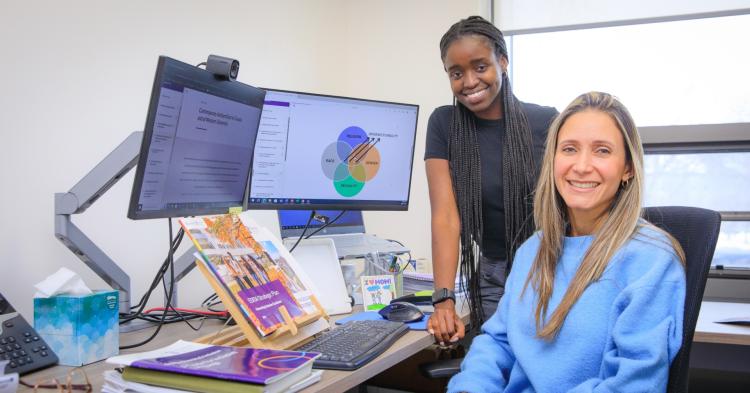Online training on antisemitism and Islamophobia, created by Western's Office of Equity, Diversity and Inclusion, is being used to educate City of London staff.
The City of London purchased two training packages developed by Western in consultation with local leaders and community groups.
Unpacking and Addressing Antisemitism and Unpacking and Addressing Islamophobia are available to Western faculty, staff and students for free. The City of London's purchase also provides all of its employees access to the two modules.

Western's EDI training modules use specific scenarios to teach about the realities of antisemitism and Islamophobia and share strategies to tackle it. The modules were designed by (L to R) Jessica Ouko, EDI coordinator, and Ana Boller, digital learning specialist in the Office of EDI, in consultation with community members and experts. (Christopher Kindratsky/Western Communications)
"I am so proud the training modules Western developed are being offered by various departments and units at the university, helping members of our community on their learning journeys and creating change beyond the campus gates," said Opiyo Oloya, associate vice-president of equity, diversity and inclusion.
"We worked with experts within the communities we serve to put together these training modules. We invited the community to be a part of the process, and together we're creating a positive impact." - Opiyo Oloya, associate vice-president of equity, diversity and inclusion
Western's Office of EDI has created 10 online modules to help educate students and employees about how to tackle racism and discrimination in many forms. The newest modules, added this year, focus on combatting ageism and sexism. Two certificates are also offered to support lifelong learning in anti-racism and anti-oppression.
"We believe we're creating change with our online modules and certificates and want to make sure the work we're doing has a transformative ripple effect into the community," said Ana Boller, digital learning specialist in the Office of EDI.
Valuable tool for city workers
The city chose to purchase licenses for two of those Western-produced modules to inform and empower staff.
"Awareness and education about the histories and experiences of equity-denied groups in our community need to be included in the information that informs the services we deliver and how we deliver them," said Krista Arnold, equity and inclusion advisor in the City of London's anti-racism and anti-oppression division.
The online modules are available to thousands of city workers.
"City staff do many different jobs, including lifeguarding, garbage collection, construction planning, accounting and so on. We're all interacting with residents in different ways. Antisemitism and Islamophobia are issues that residents are experiencing," Arnold said.
"Residents often look to city staff for acknowledgement of those experiences and problem solving from a policy and service delivery perspective. If city staff don't have a good understanding of the issues residents are experiencing, it makes it difficult to do our jobs well." - Krista Arnold, equity and inclusion advisor, City of London's anti-racism and anti-oppression division
The City of London's efforts to address hate and discrimination extend beyond training. Recently, the city launched Stop Tolerhating - a public awareness initiative aimed at challenging hate, fostering allyship and supporting equity-denied communities. Western is a partner in the campaign, which offers resources and tools to empower Londoners to take action against hate and discrimination in their daily lives.
Jewish, Muslim communities help design training
Arnold said she was drawn by the collaborative approach to building the modules.
Unpacking and Addressing Antisemitism was built with input from Western Hillel, Ontario Hillel, Jewish students and subject-matter experts such as faculty members, Boller said. All of the sources who helped build the resource were Jewish. A similar approach was taken with Unpacking and Addressing Islamophobia - all reviewers were Muslim community members, subject-matter experts or researchers.
Additional leaders and community members in those groups were invited to review the modules and provide feedback along the way.
It took almost a year to build each training course.
"Collaboration and consultation were very important. It was a thorough process to engage the community." - Ana Boller, digital learning specialist in the Office of EDI
Modules educate on microaggressions, micro-interventions
Western's modules use specific scenarios to teach about the realities of antisemitism and Islamophobia and what to do about it.
The online training was adapted - turning campus examples into workplace settings - to fit the City of London's needs.
The modules include:
- Background on cultural traditions, practices
- Common stereotypes and facts to dispel them
- Tools and strategies to challenge antisemitism or Islamophobia
- Information on microaggressions and how to respond
Boller said the training shares meaningful ways to respond when someone sees or hears a targeted action or comment.
"Microaggressions are pervasive. These are the common, daily actions and attitudes that show a negative message toward an equity-deserving community, like Jewish or Muslim community members. It can be difficult to identify them, but the impact is huge," she said. "That's why we really want to fight the stereotypes and biases that can be attached to these communities, but also the microaggressions."
Those who take the training will be given practical suggestions for micro-interventions, ways to respond to microaggressions. Responding "what do you mean by that?" when someone repeats a stereotype or makes an offensive remark is one example. That approach invites reflection, Boller said.
She's hopeful the training modules can play a role in fostering stronger, safer communities.
"Our mission is to create a welcoming and more inclusive campus where people feel they belong, and they are appreciated for who they are and what they have to offer," Boller said.
"We know this learning and education is going to make a difference to turn our vision into reality and we want people beyond Western to have these tools to be advocates and allies, too."













